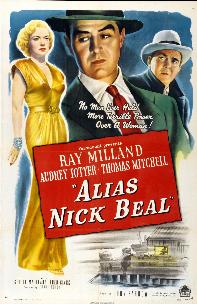Plot
Joseph Foster is an honest district attorney who wants to clean up the criminal underworld, but cannot catch their leader, Frankie Faulkner, no matter how hard he tries. After a foiled attempt to obtain critical evidence to convict an underling of Faulkner's named Hanson, Foster is left reeling.
In exasperation at another frustrated attempt, he cries out that he would sell his soul to put Faulkner behind bars. At that moment he receives an invitation to meet with a devilishly smooth-talking stranger named Nick Beal at a seedy bar beside the docks. With Beal's sinister aid he gets evidence to convict Faulkner's cohort Hanson.
Foster is encouraged by a circle of powerful admirers to run for governor. He accepts, with Beal acting as a Mr. Fixit, despite the uneasiness of his wife Martha and his good friend Reverend Garfield. Foster begins his rise to power in the company of Donna Allen, a fallen woman who is sent by Nick to entice him. Foster gets elected but resigns, sickened by the compromises he has made at Beal's instigation, forfeiting his soul. As he is preparing to leave with Beal for the Island of Lost Souls, his wife and Garfield arrive. They are able to thwart Foster's promise to Beal to accompany him by folding the contact between Foster and Beal into a copy of the Bible, thereby placing it out of Beal's reach. Beal then disappears into the foggy darkness from whence he came.
Reception
A 1949 review of the film in The New York Times held that, "Due to the fine acting and the wily direction, the story plays exceptionally well, but the script tends to be somewhat wobbly and indecisive upon reflection." [2]
A contemporary review by Film4 contended "Milland is outstanding as the personification of evil—a talent often obscured by his charm and early juvenile good looks." [3]
This page is based on this
Wikipedia article Text is available under the
CC BY-SA 4.0 license; additional terms may apply.
Images, videos and audio are available under their respective licenses.
